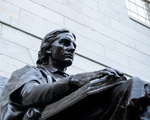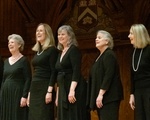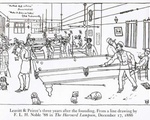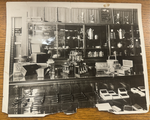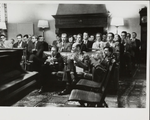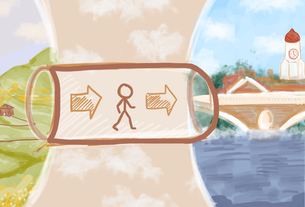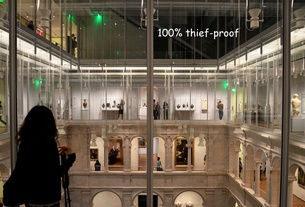Retrospection
Making John Harvard
The John Harvard sat placidly outside Memorial Hall, in what would now be part of the Science Center Plaza, for 40 years. Only in 1924 — after a years-long campaign involving the statue’s sculptor Daniel C. French — was the monument moved to its present watch place in Harvard Yard.
A Legacy of Song
According to the Pitches’ memory books, the founders wanted to create a space for themselves in an otherwise “male-oriented” campus. Fifty years later, the group continues to uphold its original mission of — literally — uplifting women’s voices.
Radcliffe Pitches Alumni
On Sunday, women from the founding class of the Radcliffe Pitches joined several decades of singers and the current Pitches cohort for a performance of sisterly kinship.
Women, Powered by Persistence
Through determined advocacy and organizing, Women Employed at Harvard fought for fair hiring practices on Harvard's campus.
Peering Through the Smoke of Time at Leavitt & Peirce
Leavitt & Peirce has been selling cologne, chess sets, and the gentleman’s indulgence since 1883. But the original owners of the store engineered it to become a quasi-social club for Harvardians in the late 1800s and early 1900s. And a social club it did become.
Harvard’s Hallowed Halloween
Today, one might spend Halloweekend partying it out at Currier’s Heaven & Hell or The Crimson’s own Crimween. But a century earlier, Halloween at Harvard was a more refined affair.
A Desk and ‘Dalliance with the Nazis’
While Roscoe Pound is often remembered for pioneering sociological jurisprudence, his time as dean contains a much more concerning legacy.
Rationality and Religion at The Social Ethics Museum
Many of the museum collections showcased mass suffering and hardship. However, Peabody hoped that the museum would elicit sympathy rather than pity, and lead students towards a moral life centered around helping the less fortunate.
‘But A Dream’: The Story of the Philosophers’ Camp
“I have never seen civilization at so high a level, in some respects, as here — and I have never seen society on the whole so good, as I used to meet at the Saturday Club,” Lowell wrote of their exploits.
Eliot Bible
The Eliot Bible, written in Wôpanâak, the language of local Native American tribes, was originally written to Christianize Indigenous people. Now, it is playing a role in Native language survival.



